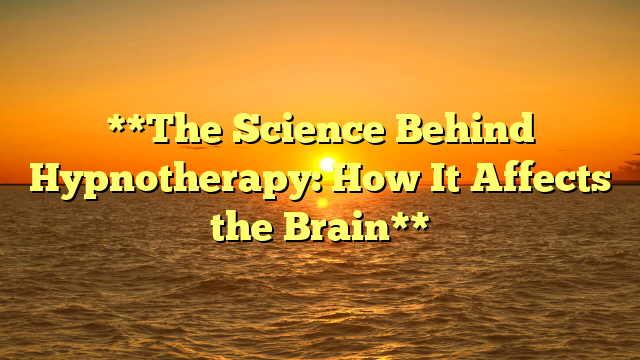
keongtogel , often surrounded by mystery and misconceptions, is a therapeutic technique that leverages hypnosis to help individuals achieve a state of focused attention and heightened suggestibility. While it has been used for centuries, modern science is now uncovering how hypnotherapy affects the brain, shedding light on its potential to treat various psychological and physical conditions.
At its core, hypnosis is a state of deep relaxation and concentration. During hypnotherapy, a trained therapist guides the individual into this trance-like state, where the mind becomes more open to positive suggestions. But what exactly happens in the brain during this process? Neuroscientific research has provided fascinating insights.
One of the key findings is that hypnosis alters brain activity in specific regions. Functional magnetic resonance imaging (fMRI) studies have shown that during hypnosis, the prefrontal cortex—the area responsible for decision-making, self-awareness, and critical thinking—becomes less active. This reduction in activity allows the individual to bypass their usual analytical thought processes, making them more receptive to suggestions. At the same time, the brain’s default mode network (DMN), which is associated with self-referential thinking and mind-wandering, also quiets down. This shift helps the individual focus intensely on the therapist’s guidance without distractions.
Another critical area affected by hypnosis is the anterior cingulate cortex (ACC), which plays a role in attention and emotional regulation. During hypnotherapy, the ACC becomes more active, enhancing the individual’s ability to concentrate and process emotions. This heightened activity may explain why hypnotherapy is particularly effective in managing conditions like anxiety, depression, and chronic pain. By modulating the ACC, hypnosis can help individuals reframe negative thoughts and reduce emotional distress.
Hypnotherapy also influences the brain’s connectivity. Research has shown that hypnosis strengthens the connection between the dorsolateral prefrontal cortex (DLPFC) and the insula. The DLPFC is involved in cognitive control, while the insula is associated with bodily awareness and emotional processing. This enhanced connectivity allows individuals to better regulate their emotions and physical sensations, making hypnotherapy a powerful tool for addressing issues like phobias, addiction, and even irritable bowel syndrome (IBS).
Interestingly, hypnosis can also affect the brain’s perception of pain. Studies have demonstrated that during hypnosis, the brain’s pain-processing centers, such as the somatosensory cortex, show reduced activity. This phenomenon, known as hypnotic analgesia, enables individuals to experience relief from chronic pain or discomfort during medical procedures without the need for medication.
Despite these scientific advancements, hypnotherapy is not a one-size-fits-all solution. Its effectiveness varies depending on an individual’s susceptibility to hypnosis, which is often measured by their hypnotizability. Some people are naturally more responsive to hypnosis, while others may require more sessions to achieve desired outcomes.
In conclusion, the science behind hypnotherapy reveals its profound impact on the brain, from altering neural activity to enhancing emotional regulation and pain management. As research continues to unravel the mechanisms of hypnosis, hypnotherapy is gaining recognition as a legitimate and effective therapeutic tool. Whether used to alleviate psychological distress or manage physical symptoms, hypnotherapy offers a unique window into the brain’s potential for healing and transformation.



